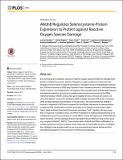Alkbh8 Regulates Selenocysteine-Protein Expression to Protect against Reactive Oxygen Species Damage
Author(s)
Endres, Lauren; Begley, Ulrike; Clark, Ryan; Gu, Chen; Dziergowska, Agnieszka; Małkiewicz, Andrzej; Melendez, J. Andres; Dedon, Peter C.; Begley, Thomas J.; ... Show more Show less
DownloadEndres-2015-Alkbh8 Regulates Sel.pdf (4.357Mb)
PUBLISHER_CC
Publisher with Creative Commons License
Creative Commons Attribution
Terms of use
Metadata
Show full item recordAbstract
Environmental and metabolic sources of reactive oxygen species (ROS) can damage DNA, proteins and lipids to promote disease. Regulation of gene expression can prevent this damage and can include increased transcription, translation and post translational modification. Cellular responses to ROS play important roles in disease prevention, with deficiencies linked to cancer, neurodegeneration and ageing. Here we detail basal and damage-induced translational regulation of a group of oxidative-stress response enzymes by the tRNA methyltransferase Alkbh8. Using a new gene targeted knockout mouse cell system, we show that Alkbh8-/- embryonic fibroblasts (MEFs) display elevated ROS levels, increased DNA and lipid damage and hallmarks of cellular stress. We demonstrate that Alkbh8 is induced in response to ROS and is required for the efficient expression of selenocysteine-containing ROS detoxification enzymes belonging to the glutathione peroxidase (Gpx1, Gpx3, Gpx6 and likely Gpx4) and thioredoxin reductase (TrxR1) families. We also show that, in response to oxidative stress, the tRNA modification 5-methoxycarbonylmethyl-2′-O-methyluridine(mcm[superscript 5]Um) increases in normal MEFs to drive the expression of ROS detoxification enzymes, with this damage-induced reprogramming of tRNA and stop-codon recoding corrupted in Alkbh8[superscript -/-] MEFS. These studies define Alkbh8 and tRNA modifications as central regulators of cellular oxidative stress responses in mammalian systems. In addition they highlight a new animal model for use in environmental and cancer studies and link translational regulation to the prevention of DNA and lipid damage.
Date issued
2015-07Department
Massachusetts Institute of Technology. Center for Environmental Health Sciences; Massachusetts Institute of Technology. Department of Biological EngineeringJournal
PLOS ONE
Publisher
Public Library of Science
Citation
Endres, Lauren, Ulrike Begley, Ryan Clark, Chen Gu, Agnieszka Dziergowska, Andrzej Małkiewicz, J. Andres Melendez, Peter C. Dedon, and Thomas J. Begley. “Alkbh8 Regulates Selenocysteine-Protein Expression to Protect Against Reactive Oxygen Species Damage.” Edited by Janine Santos. PLoS ONE 10, no. 7 (July 6, 2015): e0131335.
Version: Final published version
ISSN
1932-6203